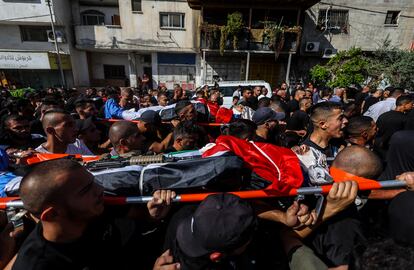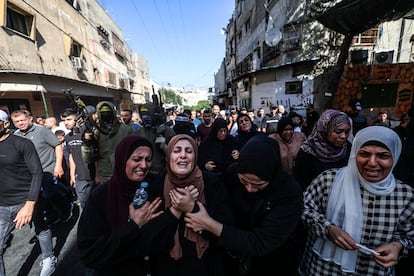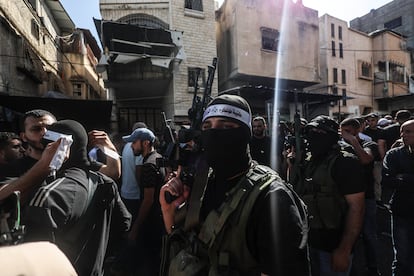West Bank demands revenge for four Palestinians shot dead by Israel: ‘They came to kill them’
The city of Tulkarem bids farewell to the four ‘martyrs’ of the Palestinian cause executed in the middle of the street by Israeli special forces for being considered Hamas ’terrorists’

Violence begets more violence. And in the Arab-Israeli conflict, even more so. The streets of Tulkarem, in the occupied West Bank, were the scene of a massive funeral and cries of revenge on Tuesday following the death of four Palestinians who were gunned down inside a car by Israeli special forces in full daylight and in front of local residents. The uniformed men arrived covertly inside a van, entering a city with a population of about 80,000. A handful of red plastic flowers, traces of blood, glass and a dented street lamp where their vehicle crashed mark the spot where they met their death, on Mohammad Ibn Al Qassem Street.
“They came to kill them, not to arrest them,” said Mehdi, 33, a witness who spoke to EL PAÍS. He resides in the house across from the spot where the events took place. A video was recorded from one of its windows, which spread like wildfire on social media. In it, officers appear to be finishing off at close range the four men who were traveling inside the car, which was riddled with bullets. The operation did not last more than five minutes, by some estimates. Afterwards, the attackers disappeared and within 10 minutes the ambulances arrived, according to witnesses.
The Israeli Defense Forces (IDF) have multiplied their operations in the West Bank along with their war against Hamas in Gaza. Since this conflict began a month ago, more than 150 Palestinians have died in the former territory, according to the Ministry of Health of the Palestinian National Authority (PNA). Additionally, more than 2,200 individuals have been detained, according to the Palestinian Prisoners Society. The four men killed in Tulkarem were part of a “terrorist” cell run by Hamas from the Gaza Strip and abroad, and responsible for carrying out “dozens of gun attacks and planning additional attacks,” according to a statement by Israel’s army, police and the Shin Bet (internal security service).
Although they glanced at each other knowingly, none of the inhabitants of the house acknowledged having recorded the footage, which shows half a dozen uniformed officers approaching the vehicle and opening the doors, then shooting some more to make sure all the passengers were dead.
The victims were Jihad Maharaj Ibrahim Shehadeh, Izz al-Din Raed Hussein Awad, Qasim Muhammad Rajab and Moamen Saed Mahmoud Balawi, according to the official Palestinian agency Wafa. To the Palestinian media, they are “martyrs” to the cause. Hours after the operation, the Israeli army carried out a raid on the Tulkarem refugee camp, where the group was based, according to Israeli authorities. Residents say that the troops remained inside the camp between 2 a.m. and 6 a.m. on Tuesday. Early on Tuesday morning, some streets were completely broken by bulldozers, while vehicles had been destroyed and some houses attacked, such as that of Islam Banna, 25, whose home was targeted by a projectile that hit the third floor.

Another one of the houses affected by the military operation was home to Izz al-Din Raed Hussein Awad, 27, one of the four killed on Monday. His father, Riad Awad, 52, received condolences, sitting with other relatives on plastic chairs lined up in front of the house. Meanwhile, several neighbors were carrying out debris. “The occupation forces that murdered my son came at night,” said the father, adding that his wife has face wounds. “They broke down the doors and went up to our room. They took us all out onto the streets.” Asked about his son, Riad Awad said that he was part of the “resistance” and that “he had been — in the past — a member of the Qassam Brigades,” the armed wing of Hamas.
“We are going to kill your son,” Awad claims Israeli authorities told him last August. Since then, the secret services had called him several times, issuing threats and assuring that they were going to kill him. On Monday, “they came to kill him, not to arrest him,” he said. “I think he was part of Hamas,” says his uncle, Nabil Awad, 49, who sits in another one of the chairs on the street, which has been enormous damaged after the military operation.
“Religious, calm and adorable”
Izz al-Din had never been to prison, according to his father, and was “very religious, calm and adorable.” “His dream was to make a life for himself, but it was impossible due to the occupation.” In front of the Awads’ house and along the entire street, several trucks and excavators are trying to clean up the refugee camp so that the massive funeral can take place.
At 10 a.m., a funeral procession dominated by the collective rage of several thousand men, dozens of them armed and shooting at the sky, left the hospital with the four corpses on stretchers on their shoulders. They headed towards the refugee camp at a brisk pace, continuing to shout loud proclamations and intoning: “There is no god but Allah and Muhammad is his prophet.”
Along the way, under a beating sun, some young people brushed the flies off the faces of the deceased, whose bodies showed wounds, bruises and bullet holes. Some attendees wore capes, headbands and green flags of Hamas, the Islamist movement that governs Gaza and whose armed wing launched an unprecedented attack on Israeli territory on October 7, leaving 1,400 people dead and triggering the current war. Also on display at the funeral were some yellow banners of Fatah, the secular party that dominates the Palestinian National Authority, which controls the West Bank. Some of the slogans revolved around the need for unity of the different Palestinian factions.
A funeral procession as massive as the one on Tuesday in Tulkarem turns a Palestinian refugee camp into a true sanctuary for the cause, the perfect breeding ground for new combatants to emerge against the suffocating Israeli occupation. Dozens of children of all ages accompanied their elders and shouted with them amid a flurry of gunshots, tears, hatred, violence and pain.
The bodies were taken to their homes, where the women, who were almost absent from the procession, said goodbye to them. After midday prayer at the mosque, they continued towards the cemetery and the bodies were laid to rest in the same grave, separated by gray bricks, without a coffin as tradition mandates. A man — the father of one of the four victims — encouraged the masses through the public address system: “There will soon be revenge!”

Sign up for our weekly newsletter to get more English-language news coverage from EL PAÍS USA Edition
Tu suscripción se está usando en otro dispositivo
¿Quieres añadir otro usuario a tu suscripción?
Si continúas leyendo en este dispositivo, no se podrá leer en el otro.
FlechaTu suscripción se está usando en otro dispositivo y solo puedes acceder a EL PAÍS desde un dispositivo a la vez.
Si quieres compartir tu cuenta, cambia tu suscripción a la modalidad Premium, así podrás añadir otro usuario. Cada uno accederá con su propia cuenta de email, lo que os permitirá personalizar vuestra experiencia en EL PAÍS.
¿Tienes una suscripción de empresa? Accede aquí para contratar más cuentas.
En el caso de no saber quién está usando tu cuenta, te recomendamos cambiar tu contraseña aquí.
Si decides continuar compartiendo tu cuenta, este mensaje se mostrará en tu dispositivo y en el de la otra persona que está usando tu cuenta de forma indefinida, afectando a tu experiencia de lectura. Puedes consultar aquí los términos y condiciones de la suscripción digital.









































